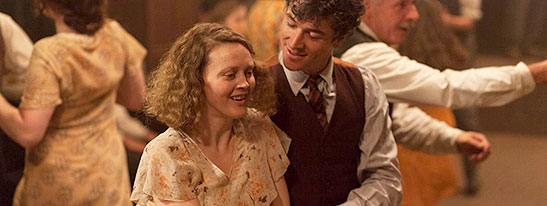
Jimmy’s Hall — rumoured to be Ken Loach’s last film — is a disappointingly inoffensive and bland portrayal of a community’s struggle with the constricting mores of the Catholic church in rural Depression-era Ireland. The film is based on the life and times of Jimmy Gralton, the only Irish citizen ever to be deported from Ireland. It begins with an atmospheric black and white montage of Depression-era images of New York, from which city we soon learn Jimmy (Barry Ward) has just returned to County Leitrim. Confusingly, the opening images of destitution turn out to have little to do with Jimmy’s experience of living in New York, where, we soon learn, he made a habit of frequenting desegregated Harlem jazz clubs and generally having a rollicking good time.
Back in Leitrim, Jimmy precedes to refurbish and reopen Pearse-Connolly Hall, a community centre with dancing and art lessons, and to exchange looks of longing desire with his now-married former love interest Oonagh (Simone Kirby). The hall’s success with the villagers angers the local priest, Father Sheridan (Jim Norton), who goes to ever more extreme measures to close down the hall while ranting about Gralton’s radical politics. The film lacks any subtlety and never moves beyond its straightforward dichotomy between the lovable villagers who just want to have a good time and listen to jazz on the one hand, and the demonic forces opposed to them, which are represented by the unreasonably conservative Catholic church, on the other.
Despite this obvious political bent, the films shies away from exploring the politics of the Irish communist leader Jimmy Gralton in any depth. Instead, Loach creates the impression that Jimmy is a mostly hapless Irishman, who aspires to little more in life than to care for his aging mother and contribute to his rural community, but who finds himself being persecuted by a number of tyrannical Catholic priests for organizing a few utterly non-euphemistic dancing lessons. The film devotes much unnecessary screen time to the failed romance and residual longing between Jimmy and Oonagh, but this romantic element feels generic and is set up too obviously in a transparent attempt to emotionally manipulate viewers. We are clearly meant to care deeply for Jimmy and Oonagh and to perceive his deportation away from his frail mother and one true love with appropriate outrage, despite the fact that friends and music await him back in New York.
Jimmy’s Hall very occasionally brushes up against more substantial political topics. In one scene Jimmy and his comrades at the hall are called on to lead a march to protest against the eviction of a poor family from their small cottage on the estate of a wealthy landowner. But this, and a flashback scene involving stolen and/or returned cows (we genuinely can’t quite remember as these moments were so brief and insubstantial), are never integrated into the central plot and therefore never offer more than cursory glimpses into Jimmy’s political convictions, which always remain frustratingly out of reach.
Even though Loach’s politics are worthy and we would agree with them for the most part, the heavy-handed, sledge-hammer-like treatment does not make for inspiring viewing. Neither the love nor the villagers’ triumphs feel earned, while their defeats are too absolute. Above all, the film’s message is too clear. Loach wants us to join him on the barricades, but merely succeeds in making us yawn.
2 out of 4 stars